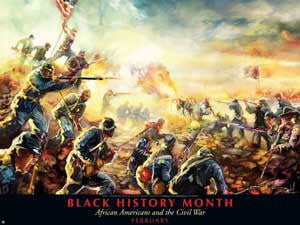
Item# B1124X36 Custom Made Black History Month African Americans and the Civil War
Share this Product
{[{GetTitle()}]}
Custom Made Poster - No Returns
Black History Month African Americans and the Civil War
Item# B1124X36
Size: 24 by 36 inches
During the Civil War close to one hundred eighty thousand African Americans in 163 units served in the Union Army. African Americans also served in the Union Navy.
Although, by act of Congress, African Americans were allowed to be enlisted in the military by July 17, 1862, official enrollment occurred after the September, 1862 issuance of the Emancipation Proclamation. There were many critics to this historical event but soon after the official enlistment, in October, 1862, African American soldiers of the 1st Kansas Colored Volunteers silenced their critics by repulsing attacking Confederates at the battle of Island Mound, Missouri.
By August, 1863, 14 Negro Regiments were in the field. At the battle of Port Hudson, Louisiana, May 27, 1863, African American soldiers bravely advanced over open ground in the face of deadly artillery fire proving their capability to withstand the heat of battle.
Bravery and courage was displayed over and over, on July 17, 1863, at Honey Springs, Indian Territory, now Oklahoma, Union troops under General James Blunt ran into a strong Confederate force. The 1st Kansas, which had held the center of the Union line, advanced to within fifty paces of the Confederate line and exchanged fire for some twenty minutes until the Confederates broke and ran. General Blunt wrote after the battle, "I never saw such fighting as was done by the Negro regiment....The question that negroes will fight is settled; besides they make better solders in every respect than any troops I have ever had under my command."
The most widely known battle fought by African Americans was the assault on Fort Wagner, South Carolina, by the 54th Massachusetts on July 18, 1863, where they volunteered to lead the assault on the strongly-fortified Confederate positions. The soldiers of the 54th scaled the fort's parapet, and were only driven back after brutal hand-to-hand combat.
African American soldiers participated in every major campaign of 1864-1865 except Sherman's invasion of Georgia. The year 1864 was especially eventful for African American troops. On April 12, 1864, at Fort Pillow, Tennessee, Confederate General Nathan Bedford Forrest led his 2,500 men against the Union-held fortification, occupied by 292 black and 285 white soldiers. After driving in the Union pickets and giving the garrison an opportunity to surrender, Forrest's men swarmed into the fort and drove the Federals down the river's bluff into a deadly crossfire. Casualties were high and only sixty-two of the U.S. Colored Troops survived the fight. Many accused the Confederates of perpetuating a massacre of black troops, and the controversy continues today. The battle cry for the Negro soldier east of the Mississippi River became "Remember Fort Pillow!"
At the Battle of New Market Heights, Virginia (Chaffin's Farm), on September 29, 1864, the African American division of the Eighteenth Corps, after being pinned down by Confederate artillery fire for about 30 minutes, charged the earthworks and rushed up the slopes of the heights. During the hour-long engagement the division suffered tremendous casualties. Of the sixteen African Americans who were awarded the Medal of Honor during the Civil War, fourteen received the honor as a result of their actions at New Market Heights.
In January, 1864, General Patrick Cleburne and several other Confederate officers in the Army of the Tennessee proposed using slaves as soldiers since the Union was using black troops. Cleburne recommended offering slaves their freedom if they fought and survived. Confederate President Jefferson Davis refused to consider Cleburne's proposal and forbade further discussion of the idea. The concept, however, did not die. By the fall of 1864, the South was losing more and more ground, and some believed that only by arming the slaves could defeat be averted. On March 13, the Confederate Congress passed General Order 14, and President Davis signed the order into law. The order was issued March 23, 1865, but only a few African American companies were raised, and the war ended before they could be used in battle.
In actual numbers, African American soldiers comprised 10% of the entire Union Army. Losses were close to one-third of their enrollment.
"Once let the black man get upon his person the brass letters, U.S., let him get an eagle on his button, and a musket on his shoulder and bullets in his pockets, and there is no power on earth which can deny that he has earned the right to citizenship in the United States." - - Frederick Douglass